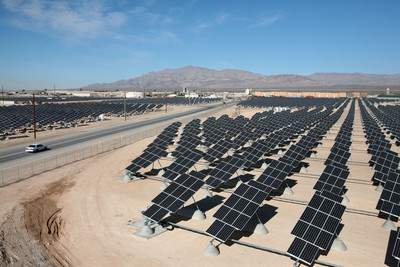Officials: Tax plan losing power

DENVER — Tax credits passed just three months ago to increase investment in renewable energy have lost much of their effectiveness amid a global economic downturn and should be reworked in Congress, industry officials said Friday.
Much of the momentum that led to a record year in the wind and solar industries will be lost if tax credits are not made refundable, putting more cash in people’s pockets, industry officials said.
Making those investments refundable would ensure continued investments sought by the incoming Obama administration, said Rhone Resch, president and chief executive of the Solar Energy Industries Association.
“Companies have started laying off workers,” said Resch. “Factories have been shuttered and many small businesses that entered into the solar industry in the last couple of years cannot get lines of credit to keep their businesses open.”
Resch said the slowdown affects not only manufacturers but installers, plumbers, electricians, roofers and other tradesmen.
Bombard Renewable Energy, a leader in the installation of solar panels at homes and small businesses, for example, has cut its work force to 12 from a peak of 95 because of sinking demand, said director Chris Brooks.
NV Energy has obtained all the renewable credits it needs for a few years from utility-scale plants at Nellis Air Force Base and Boulder City. So the utility has little incentive to promote more solar power installations, but he said solar power panels still make economic sense for consumers.
Brooks figures that the 30 percent federal tax credit and $2 a watt electric utility rebate cut the cost of a 5-kilowatt home solar system to $24,500. That locks in the price of power at 11 cents a kilowatt hour over 20 years, which already is lower than the cost of power from NV Energy, he said.
Small businesses installing solar systems may get even larger tax benefits because of depreciation, he said.
Yet, “we’ve seen sales just fall off the map,” Brooks said. “A lot fewer people have a lot less money, or, if they have it, they’re not wanting to let it go.”
“The economic downturn is affecting everyone,” said Rose McKinney-James, Nevada legislative representative of the Solar Alliance.
Late last year, Senate Majority Leader Harry Reid, D-Nev., helped push through legislation that extended federal income tax credits for renewable energy, but credits don’t help taxpayers with no taxable income.
“With the credit crunch, there are very few people out there with a tax liability,” said Rich Hamilton, president of Great Basin Wind.
“Just as we get tools that we expect to be very beneficial, we see a decline in the economy,” McKinney-James said.
While numerous companies have expressed interest in building solar power plants in Nevada, she knew of no utility-scale power projects under construction in Nevada.
Sempra Generation, the San Diego-based company that completed a 10-megawatt, solar photovoltaic power plant at Boulder City last month, is considering a 50-megawatt expansion, said spokesman Art Larson.
Hamilton expects to build a 200-megawatt wind farm in the Virginia Range between Reno and Carson City even if the new tax benefits are not approved. Yet, Hamilton said the tax benefit is needed to make other Nevada wind projects feasible.
“This will benefit the entire state of Nevada,” he said. The renewable energy industry could create jobs in rural locations where solar, wind and geothermal resources are located, he said.
Review-Journal writer John G. Edwards contributed to this report.